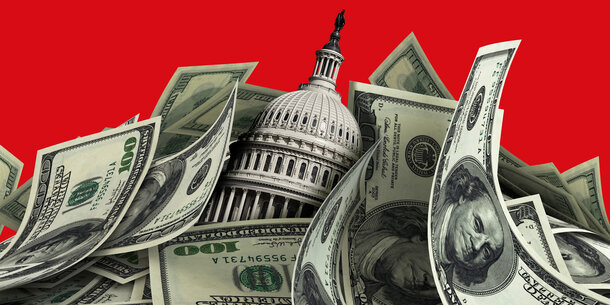It’s finally time to turn on the lights. For over a decade, there have been growing calls for transparency and accountability regarding corporate political spending and other ESG (environmental, social, and governance) issues from investors who are tired of corporations hiding the ball. These calls did not make an impact on the Obama administration, which failed to issue better rules when it had the chance, and these pleas were actively ignored by the Trump administration, which pushed corporate accountability further out of reach. The Biden administration may finally be responsive to these demands for sunlight.
Investors have been complaining to American publicly traded companies about the lack of transparency for years. Fortunately, there are already encouraging signs that the Securities and Exchange Commission (SEC) and the Department of Labor — which have been hamstrung for years — will finally act. Indeed, the Biden SEC has already indicated that it will take action on ESG issues at publicly traded companies to help protect shareholders and that the commission welcomes comments from the public. Moreover, SEC Commissioner Caroline Crenshaw penned a piece on Monday indicating that it was time for Congress to let the SEC make disclosure rules for corporate money in politics. And there are also encouraging movements at the Labor Department. Both could be steps toward getting clarity on political spending at long last.
It’s worth asking: do shareholders really give a damn about corporate political spending?
They most certainly do. Investors have submitted shareholder proposals asking for transparency of such spending since even before Citizens United. And these shareholder proposals continue to be popular nearly a decade later. As corporate governance tracker Equilar reported in 2019, “The largest percentage of social proposals . . . concern the dispensation of discretionary funds used in lobbying activities, political contributions and charitable donations. . . . A majority of these political and lobbying-based shareholder proposals have to do with political donation transparency.”
And as SEC Commissioner Crenshaw noted in her recent piece, “[i]nvestors have repeatedly requested information on political spending — last year, shareholders voted in favor of greater disclosure 80% of the time that question was on a corporate ballot.”
What explains the popularity of shareholder proposals on this campaign finance issue? For starters, in the decade since Citizens United, the SEC has dropped the ball and failed to advance a rule that would require companies to inform their investors about their political expenditures. And the Labor Department under Trump introduced a hostile rule under the Employee Retirement Income Security Act (ERISA) that barred certain investors from considering ESG factors when making investments for pension funds.
Without federal rules in place compelling corporate disclosures, shareholders have had to slog it out company by company asking for transparency through what is known as “private ordering.” After private ordering, 292 publicly traded companies are more transparent about their political expenditures today than they were a decade ago.
There is clearly a strong appetite for more clarity about how publicly traded companies spend money in politics, as evidenced by the high votes that shareholder proposals on political spending have received in the past proxy season. As the Harvard Law School Forum on Corporate Governance recently reported, “Over the last few years, investors have increasingly been focusing on political contributions and lobbying expenditures of corporations, demanding more transparency on these issues. Five resolutions that went to a vote in 2020 passed, while a dozen more barely missed the majority support threshold.”
To put this in context, receiving over 50 percent of the vote — or even near it — in favor of a shareholder proposal is a big deal, given how shares in companies are held. Founders of firms often reserve a huge percentage of shares so that they can maintain control of the firm, and they are unlikely to vote for more transparency. That means in order to win a large share of votes, the shareholder proposal must be wildly popular among both small and large investors alike. As Fortune reports, calls for sunlight on corporate political spending is gaining steam.
Beyond political spending, investors have also been calling for better disclosure of other ESG matters, especially those related to climate change. As the book The Triumph of Doubt: Dark Money and the Science of Deception shows, the issues of corporate political spending and the environment intersect at many firms. For example, a publicly traded oil company may spend untraceable dark money supporting politicians who in turn back policies that are detrimental to the environment — ultimately making the task of addressing climate change all the more arduous. And it becomes a transparency problem because investors cannot track where this dark money ends up. Given the risks, some investors use ESG metrics to help decide which company is a good investment in a world with a changing climate, but a Trump-era 2020 Labor Department rule fenced out this line of inquiry for some investors.
Under the Biden administration, however, remedies are on the horizon. To begin with, the Labor Department has decided not to enforce the Trump-era rule that made ESG an out-of-bounds consideration for those who run employee benefit plans. The department explained, “Stakeholders have . . . questioned whether the department rushed the rulemakings unnecessarily and failed to adequately consider and address the substantial evidence submitted by public commenters on the use of environmental, social and governance considerations in improving investment value and long-term investment returns for retirement investors.” Once a new rule is introduced, investors who run pension plans should have new (and hopefully better) guidance on ESG decisions.
Meanwhile, on March 4, the SEC announced the establishment of a Climate and ESG Task Force in the Division of Enforcement, which will examine whether publicly traded companies are being honest with investors about climate change risks as well as evaluate “disclosure and compliance issues.” SEC Acting Chair Allison Herren Lee stated, “Climate risks and sustainability are critical issues for the investing public and our capital markets.” A 90-day comment period is open at the SEC which is seeking input on how the commission should deal with climate change disclosures in particular.
Presumably, if the task force finds gaps in the disclosure rules themselves, they could recommend more transparency requirements from the SEC on ESG issues. We don’t know if this will actually happen or how broad disclosure could be. But given that the most popular ESG disclosure request from investors over the past decade has been about political spending, this could lead to corporate campaign finance disclosures for publicly traded firms.
A final boost for taking ESG more seriously came from John Kerry in his role as the U.S. climate envoy in the Biden White House. Kerry is apparently meeting with leaders in the financial sector to encourage investment in green energy and green jobs. Kerry pointed to the popularity of ESG investing as a reason why a market-based approach to environmental stewardship could work.
He’s right. And hopefully the SEC is listening too.
The views expressed are the author’s own and not necessarily those of the Brennan Center.



